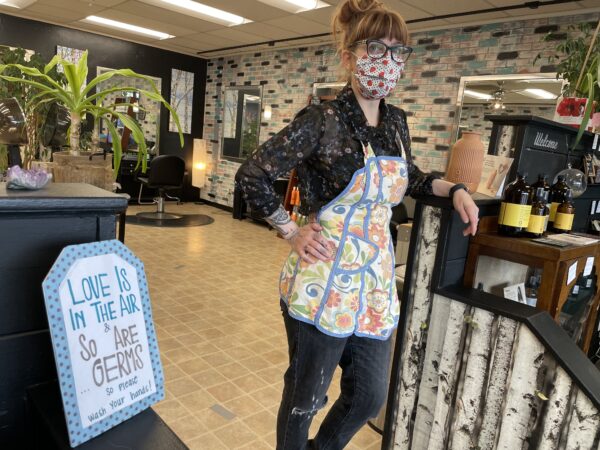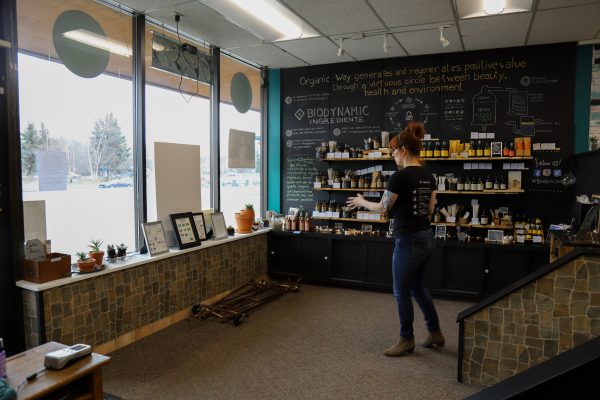
As COVID-19 case rates in Alaska continue to lead the nation, Alaska’s largest city has no municipal health measures like a mask mandate or gathering restrictions in place. That’s left businesses to navigate which prevention steps to take on their own, which can get complicated for owners trying to weigh the health risks of doing business.
Anchorage salon owner Jen Bersch has opted to create a list of strict COVID precautions. And she said she has no intention of lifting them anytime soon.
“How do I go back to doing things before? I don’t want to stop sanitizing in between people, because I don’t want [to catch] anything that people have,” she said. “And I don’t want to stop masking!”
Bersch has owned Salon DaVinci in Midtown Anchorage for 14 years. Her pandemic protocol includes a masking requirement for employees and clients plus extra thorough sanitizing between appointments. Bersch hasn’t let up on the measures since the pandemic began, even when the case rate was starting to look better in late spring.
“We’re right in your face, like right in your breath line for a minimum of 30 minutes if not several hours. So what gives? Your haircut is not more important than my health,” she said. “And honestly this summer when cases went down and that cold was going around, like, I didn’t want that either!”
Now, in the middle of the worst surge of the pandemic, she said the salon has yet to have a major outbreak — which she thinks is proof her protocol is working.
RELATED: Alaska records nearly 2,800 new COVID cases over the weekend, 4 deaths
A year ago, Anchorage had a city-wide mask mandate, along with limitations on indoor and outdoor gatherings. The muni had also issued emergency guidelines for businesses to reduce virus spread, like keeping visitor logs, improving ventilation and sanitizing surfaces more frequently.
All of those measures expired in May, a little more than a month before Dave Bronson became mayor. Last month, in response to the increasingly dire strain COVID has placed on Anchorage hospitals, the Assembly proposed a new mask mandate. It has set off more than a week of fraught public testimony. And Bronson has held steadfast to his campaign promise to impose no mandates.
“Let me be clear, I am opposed to this ordinance,” he said in a video posted to his Facebook page recently. “I believe it is heavy-handed, out of line with the will of the people and businesses of Anchorage and it serves as just the latest example of how this Assembly believes it must force people into submission through fear and government sanctions.”
Derrick Green, owner of Waffles and Whatnot in East Anchorage, thinks even if masking is effective, mask requirements aren’t. He’s taken steps to curb the risk of COVID spread like providing hand sanitizer and touchless credit card transactions and installing a ventilation system that’s supposed to cycle out the air in the restaurant every 12 minutes. He provides masks but doesn’t require employees to wear them.
“Everybody at this point are grownups, they’re adults. They decide if they want to wear a mask or not,” he said.
And they typically don’t, until the restaurant gets busy, he said.
Business has taken a hit as case numbers have gotten worse, said Green. He’s tried to make eating at his restaurant a safer experience, but says convincing diners to mask is a losing battle when they’re coming in to eat.
“They’re not going to keep the mask on, they’re going to say ‘I’m drinking.’ We went through this last year and in the end we end up suffering and losing customers,” he said.
[Sign up for Alaska Public Media’s daily newsletter to get our top stories delivered to your inbox.]
University of Alaska Anchorage economist Kevin Berry said while some holdouts will probably always refuse to wear a mask, mask mandates do lower COVID transmission. A UAA College of Health report published in January connected last year’s health mandates to subsequent drops in Anchorage’s case rate.
“We’ve seen this stuff work before, which is why there doesn’t seem to be much argument, I think, at least at the policy level,” Berry said.
Businesses implementing their own COVID mitigation measures on any level is helpful, Berry said. But a patchwork response isn’t as effective as a city-wide approach.
“It’s much more effective when everybody contributes. And the mandate helps get everybody on board. It also makes it easier for these businesses to navigate this politically because now they can use the Assembly as a punching bag,” Berry said. “So they can now say, ‘Look, I don’t want to make you wear a mask. Forrest Dunbar or Chris Constant wants you to wear a mask.’ And it allows them to do things that they maybe want to do but feel they can’t, by these other leaders sort of covering for them.”
Siri Moss, general manager at the Alaska Rock Gym, said in an email that the gym has a masking requirement for employees, 95% of whom are fully vaccinated. Moss said a major reason for the policy is to protect the large number of children who frequent the building. More than 200 children between the ages of 4 and 17 are enrolled in climbing programs, and while Moss said many are vaccinated, children under 12 aren’t eligible to receive the shots yet.
Moss said they stopped short of requiring masks for adult climbers at the gym to avoid forcing staff to police mask-wearing. She said those interactions can often turn “ugly and unproductive.”
“Our jobs are hard enough right now without introducing more stress through confrontational encounters with the public,” she said. “With no backup from the state or municipality, it is difficult to gracefully enforce a facility wide mask mandate.”
Bersch, at Salon DaVinci, said for the most part clients are happy to comply with her masking requirement, but enforcing the protocol was easier with a mandate.
“People just would then assume that you’re masking whereas now it’s like we have to remind people repeatedly ‘Don’t forget that we’re still masking,’” she said.

A city mandate might have also given Bersch some backup recently when one woman who refused to mask up canceled her haircut on the spot, and later disputed the credit card charge for her appointment deposit.
Bersch said eventually, whenever the pandemic gets under control, she knows her small team will go back to the old way of doing things, but for now they all appreciate the extra layers of protection, even if she has to set the rules herself.
Kavitha George is Alaska Public Media’s climate change reporter. Reach her at kgeorge@alaskapublic.org. Read more about Kavitha here.





